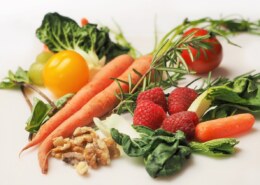What are fat-soluble vitamins?
Fat-soluble vitamins are absorbed with fats in the diet and are stored in body fat and liver tissues. They are found in many plant and animal products, as well as in food supplements.
They are simply vitamins that can dissolve in fats and oils.
What are Fat Soluble Vitamins?
Fat-soluble vitamins are vitamins A, D, E, and K. They are found in foods that contain fat.
The body absorbs these vitamins the same way it absorbs dietary fats. They do not dissolve in water.
Vitamins help the body to function efficiently.
There are two types: water-soluble and fat-soluble vitamins.
Water-soluble vitamins are the B and C vitamins.
Vitamin A
Vitamin A helps the body’s immune system and also maintain healthy vision.
Without vitamin A, a person can develop vision problems and possibly vision loss.
Vitamin A is actually a collection of compounds known as retinoids.
Retinoids occur naturally in the human body, and they are present in some diets.
Some foods provide retinols, which the body can use as vitamin A directly.
Some other food products provide provitamin A, a compound that the body converts into vitamin A.
Nutritional Sources
Vitamin A can be obtained from both plant and animal sources.
Best food sources of vitamin A in nutritional diet include dairy products from animals like liver, fish, cheese and fortified cereals, best sources of plant’s provitamin A include carrots, broccoli, cantaloupe, and butternut squash.
Vitamin D
Vitamin D performs the role of building strong bones and also supports the immune system.
Vitamin D are group of compounds known commonly as calciferol.
The body gets the compounds it needs to obtain vitamin D from food.
It also produces vitamin D when ultraviolet (UV) light shines onto the skin.
Nutritional Sources
A person can get some vitamin D from the sun, but most people will have to use alternative sources from food products such as fish oil, fortified dairy products, plant-based milk, beef liver and eggs.
Vitamin E
Vitamin E is an antioxidant that can help the body fight off oxidative stress.
It gives immunity boost and helps to dilate blood vessels and prevent thrombosis.
Nutritional Sources
Good sources of vitamin E include nuts, such as almonds, peanuts, and hazelnuts, and vegetable oils, such as sunflower, wheat germ, safflower, corn, and soybean oils.
Sunflower seeds and green, leafy vegetables such as spinach and broccoli also contain vitamin E.
Vitamin K
Vitamin K helps the body in the process of blood clotting, strengthens bones and lower the risk of heart disease.
Vitamin K have two common types that the body needs, Vitamin K-1 from plants and Vitamin K-2 from animals.
Nutritional Sources
Vitamin K is found in the following foods: Green leafy vegetables, such as kale, spinach, turnip greens, collards, Swiss chard, mustard greens, parsley, romaine, and green leaf lettuce.
Vegetables such as Brussels sprouts, broccoli, cauliflower, and cabbage. Fish, liver, meat, eggs, and cereals.
Credit:
https://www.medicalnewstoday.com/articles/320310#vitamin-a



Leave an answer
You must login or register to add a new answer.